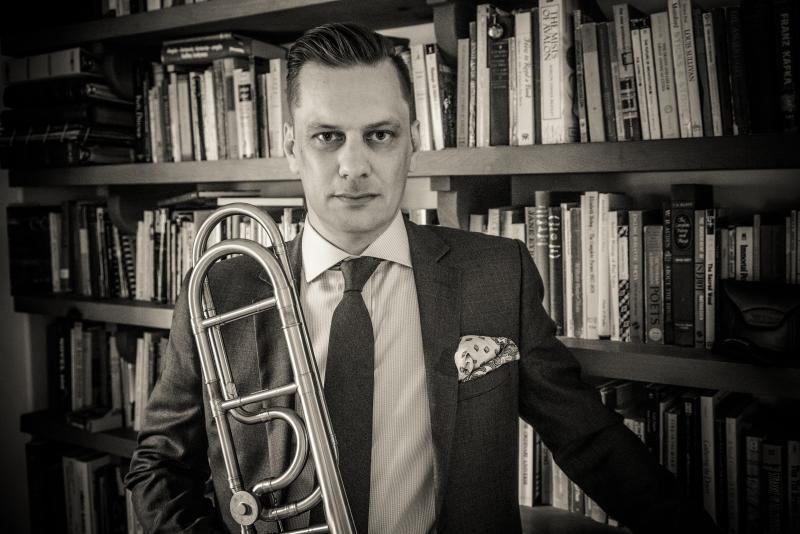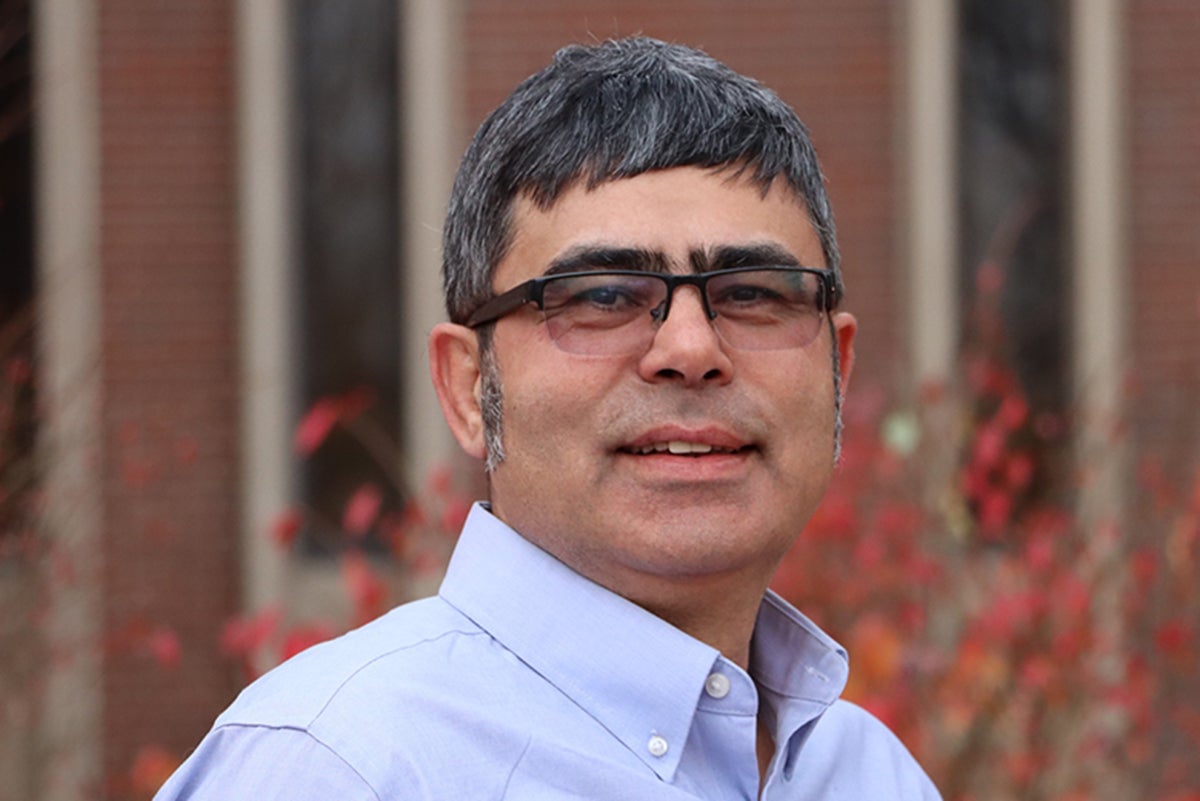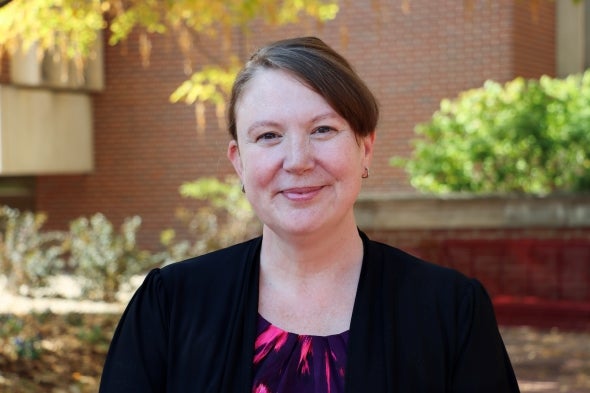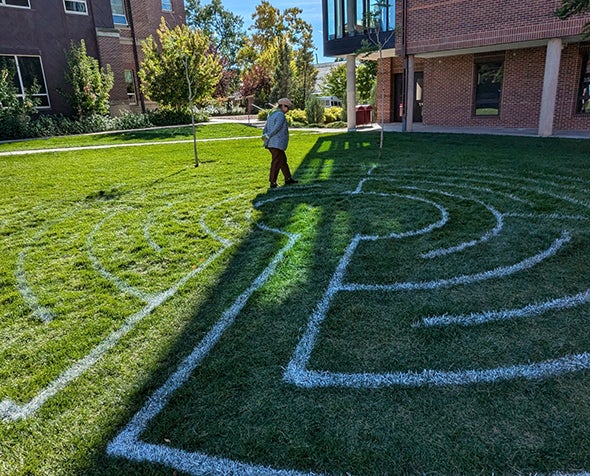CAHSS Professor Embraces the Power of Music to Bring Light to Darkness, Comfort and Heal

When a visiting music teacher in primary school first put a euphonium [a small brass instrument resembling a tuba] in Richard Harris' hands, he was instantly hooked. Recognizing his new student’s ability, the teacher “threw me into the deep end to play with older, more experienced students in instrumental ensembles and jazz bands which we know now is a great way to learn,” Harris said.
The assistant professor of trombone in the Lamont School of Music went on to study at the Royal Academy of Music before landing a position performing in an orchestra in Germany and later earning a master’s degree in trombone performance from Indiana University (IU). His professor/mentor there had played with the Philadelphia Orchestra for 20 years. “But he always said that his best days were spent as a professor and that struck a lasting chord,” Harris said. He vowed to ultimately seek a teaching position in higher education, too.
Following graduation, Harris spent three seasons with the New World Symphony Orchestra led by Michael Tilson Thomas before relocating to New York City. There he forged a wide-ranging career that included performing with the Metropolitan Opera and leading orchestras nationwide and at Carnegie Hall and Radio City Music Hall, among other renowned venues.
He has played with Esperanza Spalding on her GRAMMY-award-winning album in 2020, on Oscar-winning scores including the “Joker,” and with iconic musicians such as Sting, Snoop Dogg, Natalie Cole and Seth McFarlane and classical music greats including Luciano Pavarotti and Andrea Bocelli.
Through it all, Harris prioritized using music to enlighten some of the darkest places and support people facing “the worst times of their lives,” bringing music to homes for the mentally disabled, hospitals, retirement communities, prisons and New York City public schools. He served as program director for Decoda, a Carnegie Hall-affiliated collective ensemble dedicated to bringing musical performances into nontraditional settings and partnering with community organizations including New York City’s Administration for Children’s Services.
Children who have been removed from their homes for physical or sexual abuse are housed there temporarily, Harris explained. “Our goal was to make those kids forget what they were going through for 45 minutes. We’ll never be compensated millions of dollars for our music but being able to touch people in that way is a privilege and rewarding beyond measure.”
Although he relished his years in New York, the birth of his first child reignited his original intention to teach. “Once we had a one-year-old, my wife and I started thinking about a backyard and living at a slightly slower pace.” The position at Lamont came up and a line in the job description about guiding young musicians in the 21st century sounded like the perfect fit.
Harris and family relocated to Denver and he started at Lamont — where he continues to work closely with undergraduate and graduate students — in 2020. “I have eight-to-10 students in my trombone studio versus a big school where it’s more like 18 to 20 so, the amount of time and energy I can give each of them is a lot better,” he said.
All his students participate in the symphony orchestra, the wind ensemble and the jazz orchestra “whereas at some big schools where undergrads are competing with master’s and doctoral students, you may not get to play in a large ensemble at all.”
Harris engages with students primarily one on one and strives to build a vibrant community with diverse goals ranging from playing with orchestras and applying for international competitions to gaining entry to musical festivals, military bands and preparing for recitals championing underrepresented composers.
"Professor Harris has been a great advocate for me,” said Christopher Terrazas, trombonist with Denver Brass and principal trombonist with the Greeley Philharmonic Orchestra who earned a master’s degree in trombone performance in June 2022 and an additional certificate in trombone performance in June 2023.
“He helped me become more disciplined and continually encouraged me to strive for excellence through solo competitions and professional orchestra auditions. I gained much confidence through my time with him, and I owe much of my musical success to his unwavering support."
Harris encourages students to dream big and broad. “The intersection of music and technology means today’s students can invent their own jobs,” he said. A good friend, for example, commissioned an original piece for cello and AI. “He played every performance live and then the AI created a completely new cello part and played alongside.”
To inspire students to embrace the power of music to comfort and heal, Harris often shares a story about his friend Aaron, a conductor, and his wife Rachel, who Harris met during his time performing with the long-running Broadway show “Aladdin.”
“The mom said they still imagine their daughter teaching people the song and movements in heaven,” Harris said. “As a father, it was heartbreaking, but I share the story because this little song that I performed and never really thought about turned out to be incredibly meaningful and a big part of this family’s loving memory of their child. The lesson is to never take for granted the power and possibilities of what we do.”
“Rachel started this educational music thing called ‘Songs for Little,’ first performed in New York coffee houses and moving to YouTube videos when the pandemic started,” Harris said. “Children loved it, and the videos just blew up.”
The couple asked Harris to perform the trombone part for a new song called “This Is Up” they had written and agreed to perform on the “Today” show. It took Harris 15 minutes to record in his studio and he forgot all about it, until he received a forwarded email from Rachel months later from the mother of a 19-month-old girl who had passed away.
“She said her daughter loved all the songs, especially ‘This Is Up.’” Harris said. The parents played it at her funeral and 300 children and adults sang along and performed the accompanying movements.
“The mom said they still imagine their daughter teaching people the song and movements in heaven,” Harris said. “As a father, it was heartbreaking, but I share the story because this little song that I performed and never really thought about turned out to be incredibly meaningful and a big part of this family’s loving memory of their child. The lesson is to never take for granted the power and possibilities of what we do.”





